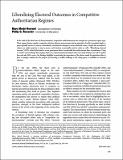| dc.description.abstract |
In the wake of the third wave of democratization, competitive authoritarianism has emerged as a prominent regime type. These regimes feature regular, competitive elections between a government and an opposition, but the incumbent leader or party typically resorts to coercion, intimidation, and fraud to attempt to ensure electoral victory. Despite the incumbent’s reliance on unfair practices to stay in power, such elections occasionally result in what we call a “liberalizing electoral outcome” (LEO), which often leads to a new government that is considerably less authoritarian than its predecessor. Using a “nested” research design that employs both cross-national statistical analysis and a case study of Kenya, we seek to explain how and why LEOs occur. Our findings highlight in particular the importance of the choices made by opposition elites to form a strategic coalition for the purpose of mounting a credible challenge to the ruling party or candidate in national elections. |

